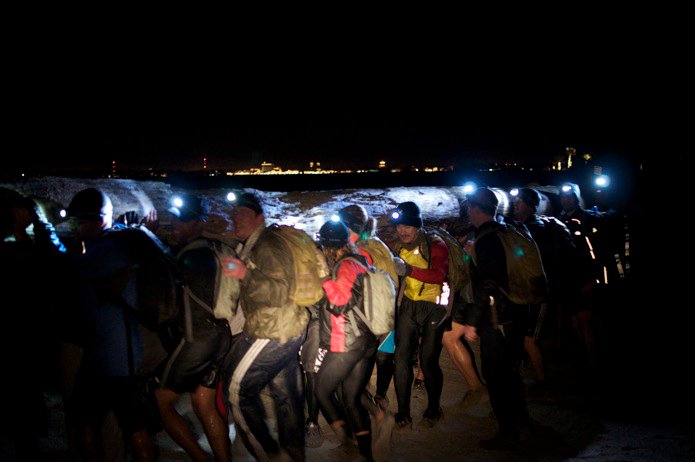I’ve been getting a lot of emails since I published my GoRuck St Augustine Review from guys and gals who are looking for advice on training for the GoRuck Challenge. In this post, I’ll review the training I went through, what I thought worked and what didn’t, and offer some suggestions.
Here’s a summary of the workload for GoRuck Class 007 in St. Augustine, Florida: 23 – 24 miles of distance, most of which was done Indian-run style. Running was done primarily on sidewalk or pavement, with a couple of bridges thrown in, and about 6-7 miles were on soft beach sand. All participants had a GoRuck pack loaded with 3 bricks (approx. 20 lbs) and whatever extra gear and food/liquids they needed. I estimated my pack, fully loaded and dry, weighed about 32 lbs.
Exercises included a few sets of flutter kicks, pushups, and air squats, but this was trivial compared to the running. Unless Jason changes up the format of the GoRuck (wouldn’t put it past him), you can almost not train for those movements.
We jumped in the water at three different points during the night and were completely soaked, muddy, and sandy, which added several extra pounds of weight. It’s possible that my pack after a thorough soaking was close to 40 lbs. Air temps were in the lower 40’s.
My Training
I go to a Crossfit gym 3 times per week. I also see a personal trainer for strength and conditioning another 2-3 times per week and I’ve been doing that for almost a year leading up to the GoRuck. Outside of the gym, I did a handful of weighted runs on my own or with buddies. Breakdown:
Crossfit: Great for anaerobic threshold training and overall fitness improvement. Provided more than enough stamina to handle the pushups, flutter kicks, and other body weight movements from GoRuck. Also helped with shoulder and back strength to handle the weighted pack.
One thing that helped me prepare mentally was doing Murph with a weighted pack several weeks prior to the Challenge. Murph is:
1 mile run
100 pullups
200 pushups
300 air squats
1 mile run
Murph is no joke without weight, but with a backpack it was a beast, especially on the pullups. After finishing I was ready to kick some serious ass. My weighted Murph time was ~57′.
Personal Training: We usually did lower body and legs on Tuesday and upper body on Thursday. The Tuesday workouts included things like heavy leg presses, squats, deadlifts, tire flips, and many many lunges. Some of the lunges were weighted, with either 30 or 50 lbs. I think the leg work, more than anything, conditioned me properly for the GoRuck loads and kept my knees and ankles healthy throughout. I’ll talk about injury a bit below, but the legs stuff was a big deal, as I historically have had knee problem with high mileage. The last real marathon I did I sustained an IT band injury that knocked me out of running for over 6 months.
Weighted Runs: Did several weighted runs with a backpack loaded with plate weights. Longest run was 8 miles and I did this with two friends at what we thought was the GoRuck pace. This was very helpful to get used to the gait of a weighted run, which is very different from normal running. Also gets you used to the loads on your shoulders and back. Without these weighted runs, I wouldn’t have been mentally prepared.
One other thought on this, I do NOT recommend using a weight vest as a substitute for a weighted pack. The vest is tight on the body while the pack has some bounce to it, and thus won’t simulate your weighted stride properly. What that basically means is the vest is easier to run with and easier = bullshit. Get the full weight on your back and shoulders because that’s good livin’.
My Recommendations
If you lift weights or Crossfit regularly, you’ll have zero problem with the land exercises. That was minimal. The running is a killer, and I recommend going on weighted runs every week leading up to the GoRuck. If you can get in 5-6 runs at varying lengths, including several that are multi-hour, then great. If you suspect you’ll be hitting the beach because the Challenge is in a beach town, absolutely go on weighted runs on the beach. This is critical because beach running is brutal compared to pavement.
Since you’ll be doing Indian runs all night long, also do interval work on pavement. Something like 20 x (15″ bursts / 50″ easy jogging) over several workouts will do the trick. Do interval work WITH a weighted pack to get used to the loads.
If you can’t afford to hire a personal trainer like me, then at least go on LONG lunge walks. When I say long, I don’t mean 200 meters. I mean, do a lunge walk around a city block, something that will take you a half hour to complete. Yes, your legs will be smoked, but you’ll have bionic knees inside of a month. Also do long lunge walks with a weighted pack. Spend time doing this and embrace the suck. I’m also a big believer in hill running and incline repeats…if you have hills in your town (we don’t in Florida), sprinkle in hill repeat days a couple of times leading up to the Challenge. I recommend 8-12 repeats per session. This will strengthen your legs.
One other thing, it’s totally possible you’ll have to carry an extra brick or gear for several hours during the event, depending on the composition of the group. We had a huge group and several of the athletes broke down and could not physically continue while bearing the weight. We distributed the weight among everyone else. I carried 1 extra brick for almost 4 hours, and even took on a fifth brick for almost an hour. You’ll also be doing buddy carries and may have to carry someone else’s entire pack for short distances. GoRuck Challenge is all about teamwork.
Pacing
The pacing will be affected by the size of the group, quality of athletes, and how aggressively Jason wants to push you, but expect the pace to be slightly *harder* than you expect. I expected basically an easy jog the whole night and was surprised to find hours of Indian runs and a pace that actually had me breathing hard. There is no lolly gagging on the run, you’ll be moving with a purpose. Expect breaks every so often to eat and go to the bathroom.
Injury Prevention
This was a big problem for our class, as I know of three athletes who ended up with significant knee injuries, one guy with a ankle injury that still affects his running 3 months later, and two dudes who stress fractured a foot, including myself. That was just the handful of people I talked to, and there could be more because we had a big class (22 people total). I could put no weight on my foot for a full week after the Challenge, and the stress fracture had me off running and lower body workouts for a month.
I attribute my injury to having shitty footwear. I wore 2-year-old Asics because I didn’t want to trash my new shoes with mud and beach sand, which was a big mistake. For one, the Asics are crap, and not designed for long distance running. I HIGHLY recommend going with comfortable, high performance footwear that you trust for marathon distances. If you need to buy new shoes for this event, don’t hesitate to do so.
My biggest fear was an overuse knee injury that would knock me out of training for months, as I’ve had these in the past. I’m happy to say my knees were strong and healthy throughout and I attribute this 100% to the work I did in the gym. Hit those lunges and make sure your joints and connective tissue are indestructible. You want the legs of Robocop going into this.
Final Thoughts
While the physical part was extremely difficult, the mental component of the the Challenge was even harder. It’s a long LONG grind to go through 10 hours of humping weight while you’re wet, cold, hungry, and tired. Lean on your teammates when the going gets tough and think only positive thoughts. Remember, you’re living a unique experience, something that 99.9% of the population wouldn’t even consider doing, and you WILL finish. Embrace your destiny as a badass Warrior King and you’ll be just fine.
Any thoughts or comments on ways to prep for GoRuck Challenge are welcome, please leave in comments. Hope this helps!


